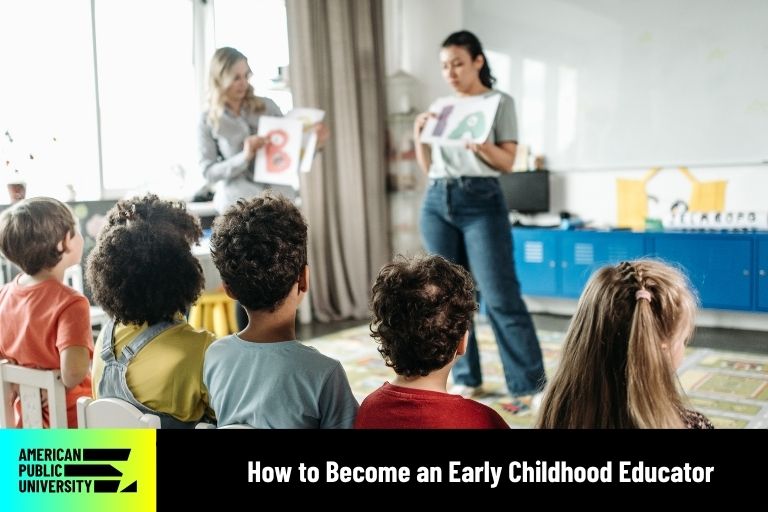06/12/2025

Early childhood education is a vital discipline dedicated to fostering the cognitive, emotional, and social growth of children from birth to age eight. Individuals who choose to pursue this path often work in diverse settings, including daycare centers, preschools, kindergartens, and elementary schools. Those considering how to become an early childhood educator may find that it involves a combination of formal education, training, and practical experience.
According to the U.S. Bureau of Labor Statistics, employment of preschool teachers is projected to grow by 4% from 2022 to 2032, reflecting ongoing demand for early learning professionals. As research continues to highlight the long-term impact of early learning, the field remains relevant in both public and private education systems.
What Does an Early Childhood Educator Do?
Early childhood educators are responsible for creating learning environments that support the development of social skills, basic academic concepts, and emotional growth.
Whether working as a preschool teacher, teacher’s aide, or kindergarten teacher, their duties may include:
- Developing and implementing lesson plans
- Monitoring developmental progress
- Communicating with students' parents
- Facilitating structured and unstructured play
- Supporting routines that promote cognitive and social development
Educators typically specialize in a specific age group, such as toddlers, preschoolers, or early elementary students. They must be adaptable, patient, and committed to meeting the needs of young children in a classroom setting.
Education Requirements for Early Childhood Educators
To become an early childhood educator, you’ll need to meet certain education requirements, which can vary by state and role:
Associate Degree
An associate degree in early childhood education (ECE) may qualify individuals for entry-level roles in childcare centers or as assistant teachers. This two-year degree includes coursework in child development, early childhood education programs, and classroom management.
Bachelor's Degree
In many states, a bachelor’s degree in early childhood education is a common requirement for teaching in public school settings, including positions as elementary school teachers and lead teachers. Students pursuing this degree often complete:
- General education coursework
- Specialized courses in child development, lesson planning, and classroom assessment
- A student teaching placement to gain supervised practical experience
The degree may also prepare students to pursue early childhood certification, depending on state licensure requirements.
Certification and Licensure for Early Childhood Educators
Certification standards differ by location. Some common requirements include:
- Earning a Child Development Associate (CDA) credential
- Completing a bachelor's degree and passing a state certification exam
- Meeting continuing education or professional development benchmarks
In many states, a CDA is a recognized credential for working in preschool or daycare centers, while state teacher certification is necessary for public elementary school roles.
Skills and Qualities of Early Childhood Educators
Successful early childhood educators demonstrate a blend of soft and technical skills, including:
- Communication skills: interacting effectively with children, families, and colleagues
- Organizational skills: managing schedules, lesson materials, and classroom activities
- Adaptability: responding to different learning styles and developmental needs
- Patience and empathy: supporting children through various emotional and behavioral phases
Educators are often tasked with designing developmentally appropriate activities, tracking student progress, and maintaining a safe, nurturing space for learning.
Where Early Childhood Educators Work
The settings for early education professionals are diverse, and include:
- Public schools (kindergarten and early elementary)
- Private schools, including Montessori schools
- Childcare centers and daycare centers
- Head Start programs
- Home-based care settings
Some may also work in summer programs, after-school care, or transition into administrative roles such as program director or curriculum coordinator.
Typical Career Paths in Early Childhood Education
The field supports a variety of early childhood education careers based on education level and experience. Common roles include:
- Preschool teachers
- Kindergarten teachers
- Assistant teachers or teacher’s aides
- Childcare workers
- Early childhood education teachers
- Program directors
- School counselors (typically requiring graduate-level education)
Each of these roles involves a different level of responsibility, and some individuals may progress to additional responsibilities through continued education or certification, depending on employer needs and qualifications.
Steps To Become an Early Childhood Educator
If you’re wondering how to become an early childhood educator, the process generally includes:
- Complete a high school diploma or equivalent
- Enroll in an early childhood education program (associate or bachelor’s)
- Gain practical experience through fieldwork or student teaching
- Pursue certification based on your state’s requirements (e.g., CDA or teaching license)
- Apply for teaching positions in public, private, or childcare settings
- Continue professional development through workshops, courses, or advanced degrees
Some professionals choose to pursue a master’s degree in education or related fields to transition into roles in leadership, curriculum design, or counseling.
Job Outlook in Early Childhood Education
As touched upon above, the Bureau of Labor Statistics (BLS), employment for preschool teachers is projected to grow by 4% through 2032, suggesting a steady need for trained professionals in early childhood education settings. While job growth for childcare workers may be more limited, the field continues to rely on educators to support learning and development during formative years. Roles may vary by region and employer type, with schools and centers adapting staffing to meet classroom needs and maintain favorable student-teacher ratios.
Preparing for a Career in Early Childhood Education
Pursuing a role in early childhood education may involve building a foundation in child development, strengthening communication skills, and gaining experience with young learners. Public schools, private schools, and childcare centers all rely on educators who are familiar with the needs of children in their early years.
This field typically includes a range of career paths and flexible education options. If you're exploring early childhood education, it may be useful to look into certification requirements, compare program types, and think through which roles align with your interests and strengths.
Ready to take the first step toward a career in early childhood education? Begin with an associate degree in early childhood care and education to build foundational knowledge and hands-on experience for the classroom.